Planting the Seeds of Justice
BY JOHN DOUGHERTY | October 26, 2023
Here’s how I imagined conversations about justice with my kids would go, before becoming a parent:
Me: Do you understand, now, why Zootopia’s treatment of race and policing is deeply problematic, Hypothetical Child #1?
Hypothetical Child #1: Indeed. Thank you for helping me to form a well-educated solidaridad, Father.
Me: Of course. Now, how about we go compost?
Here’s how these conversations actually go:
Daughter: We played a game at school where we were police officers and we put the bad guys in jail!!
Me (stirring boxed mac and cheese that’s almost certainly filling us with microplastics): Uh… well, you know, in real life, prisons aren’t really the best way to solve problems, and a lot of people who go to prison aren’t ‘bad guys,’ they’re just…
Daughter: DADDY, GUESS WHAT! [Friend] has a Miraculous backpack!!!
I don’t need to tell you that teaching kids about faith and justice is hard. In my experience, it involves lots and lots and lots and lots of trying and occasional glimmers of success. Often I’m tempted to give up and wait until they’re older and can engage these topics with more nuance and understanding (my kids, for reference, are two and seven).
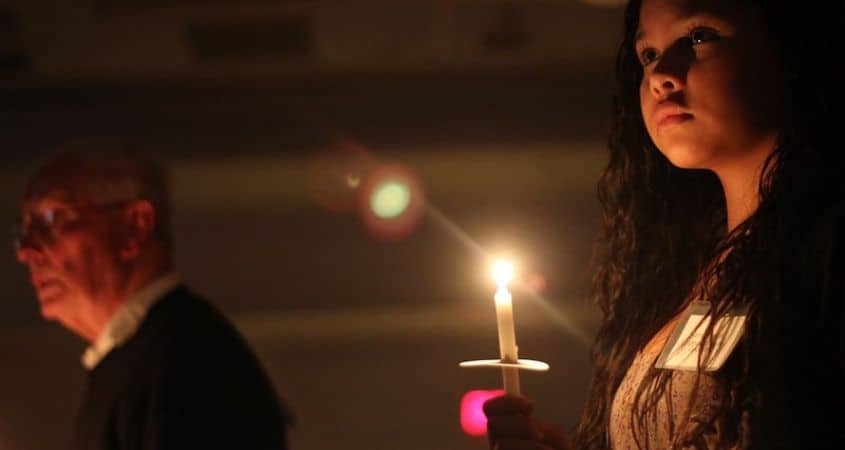
But I believe there’s a real value to these little efforts, even if we won’t see the results for a long time. Parenting isn’t about molding your kids into a shape you’d like to see; it’s about planting seeds, and providing the tools they’ll need to navigate this world with hope, courage, and love.
Our daughter is currently in second grade, and since birth we’ve tried to surround her with a vision of faith that lives justice. She attended her first public witness at six months old, snoozing in a Baby Bjorn at a gathering to honor the victims of the Pulse nightclub shooting and demand gun reform. Obviously I knew she wouldn’t remember it, but it felt important to bring her, to start as early as possible. As she grows up we’re intentional about where we go to Mass, what we read and watch, how we talk to and about God. This is also the reason that we’ve brought her to (almost) every Ignatian Family Teach-In for Justice in her lifetime, including one in utero.
Does this mean she’s become a Super Justice Child, a miniature Dorothy Day in a Cinderella dress? No, she’s a normal seven-year-old. She can be kind and generous, but also selfish and careless, in the innocent way all kids are. Christ is still functionally someone she hears stories about, not someone she has a relationship with. And even now when we take her to the Teach-In, she’s more eager to run around the hotel lobby or color on her tablet than in what’s happening on the mainstage.
Again, she’s seven. This is as it should be. But it can also be discouraging. Imagine listening to a really powerful keynote speaker, thrilled that your kid gets to be present for a moment like this, and then she tugs on your sleeve and says—in what is only technically an inside voice—“CAN I WATCH ON YOUR PHONE?” In those moments, I wonder if the effort to bring her to things like this is worth it. I didn’t go to them until college, and I ended up with the commitments and faith that I have. Maybe it would be better to wait.
But then you get those little glimmers of success, a brief confirmation that seeds are taking root. I had one at last year’s Teach-In. She came with me to the Prayer for the Jesuit Martyrs, as my wife put her brother to bed. If you’ve never been, this prayer ends the first night of the conference: a litany of Jesuits (and others) killed for their prophetic witness in the modern age, with each name followed by the response “Presente.” They are present, still with us.
My daughter was very tired, her head drooping on my shoulder. But midway through the prayer, she asked whose names we were saying. I don’t know if you’ve ever had to explain martyrdom and political repression to a (then) six-year-old. It’s not easy, but I tried: I said something like the martyrs were people who lived the way Jesus told us to, and spoke up for people who weren’t being treated right. Some other people in power didn’t like that, so they killed them.
“Oh,” she said.
I don’t know how much she understood or remembered. But when they read the next name, she joined the response: “Presente.” That’s a start. Of all the things we offer our children, maybe that’s the most important.
John Dougherty is a Catholic writer and campus minister with over a decade of experience in Jesuit education. He lives in New Jersey with his wife and children.

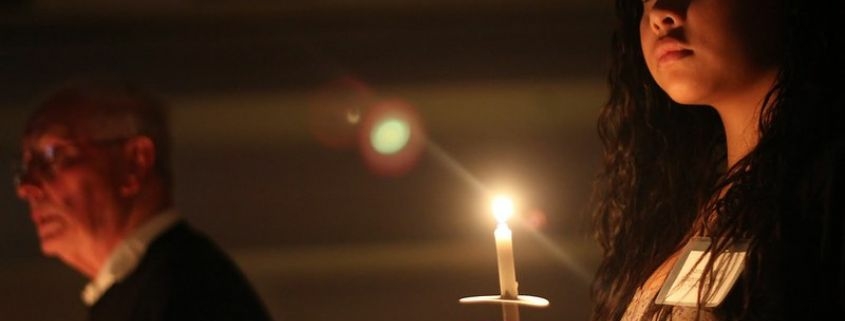

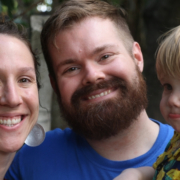

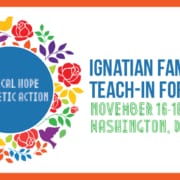
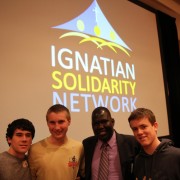

Planting the seeds of justice is good pedagogy. “An education which does not teach us to discriminate between good and bad, to assimilate the one and eschew the other, is a misnomer” – says Mahatma Gandhi